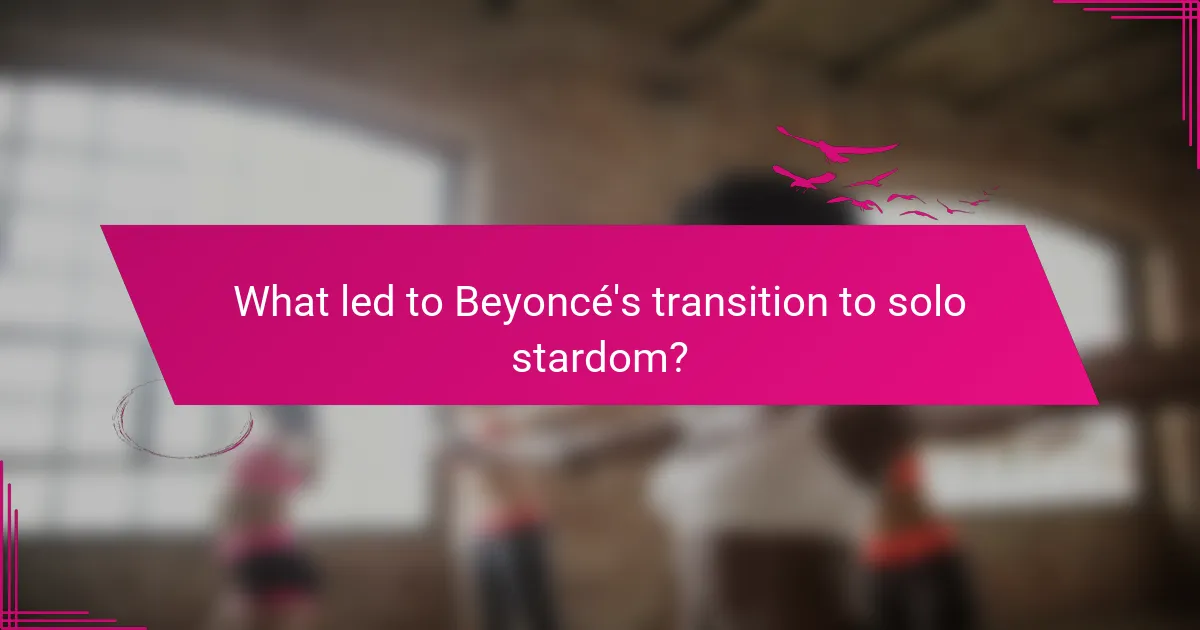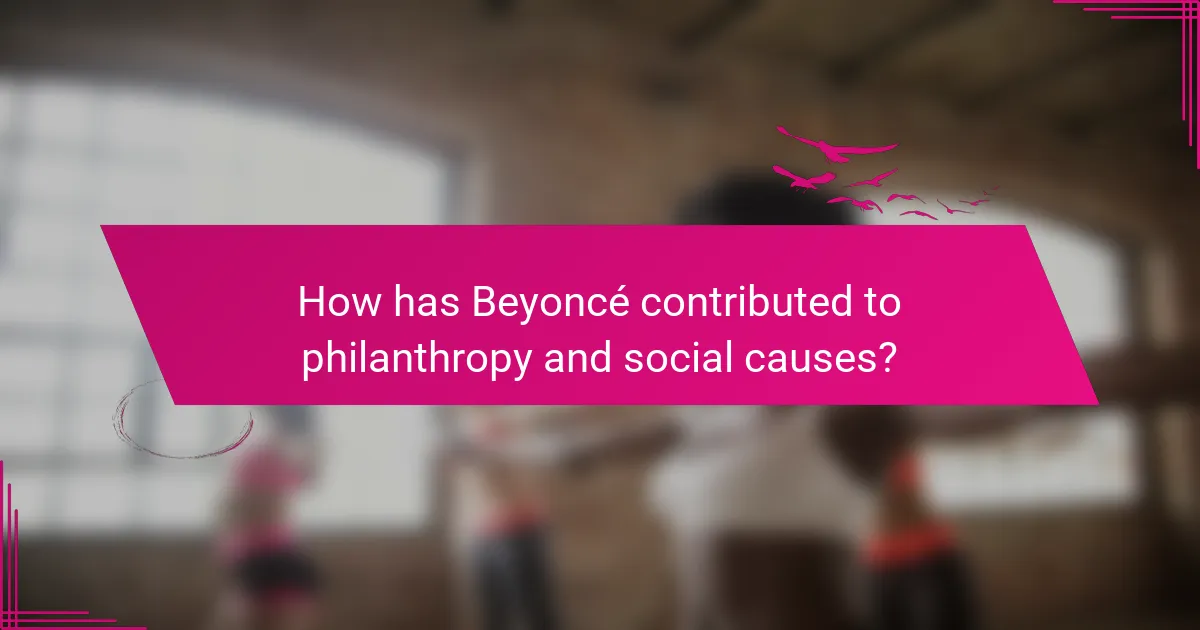
What is the Journey of Beyoncé?
Beyoncé’s journey began as a member of Destiny’s Child. The group formed in the late 1990s and became one of the best-selling girl groups. They released multiple hit albums and singles, including “Say My Name.” In 2003, Beyoncé launched her solo career with the album “Dangerously in Love.” This album produced chart-topping hits like “Crazy in Love.” She won five Grammy Awards for this work, establishing her as a solo artist. Over the years, she released several successful albums, including “B’Day” and “Lemonade.” Beyoncé is known for her powerful performances and vocal abilities. She is also recognized for her philanthropic efforts, supporting various causes and organizations.
How did Beyoncé’s early life influence her career?
Beyoncé’s early life significantly influenced her career by shaping her musical talent and work ethic. She began singing at a young age, participating in various talent shows. Her mother, Tina Knowles, was a costume designer and encouraged her artistic pursuits. This support fostered Beyoncé’s creativity and confidence. Additionally, growing up in Houston, Texas, exposed her to diverse musical influences. She was inspired by artists like Tina Turner and Whitney Houston. Beyoncé’s early experiences in local music competitions honed her performance skills. These formative years laid the foundation for her later success with Destiny’s Child and her solo career.
What were the key moments in her childhood that shaped her?
Beyoncé’s childhood was shaped by several key moments. Her early exposure to music came from her mother, Tina Knowles, who was a professional costume designer and a member of a girl group. At a young age, Beyoncé participated in local talent shows, showcasing her singing abilities. This early experience built her confidence and passion for performance.
Additionally, she formed a girl group called Girl’s Tyme at the age of eight. This group later evolved into Destiny’s Child, which marked her entry into the music industry. Beyoncé’s parents encouraged her artistic pursuits, providing a supportive environment that nurtured her talent.
Her participation in the Houston Grand Opera as a child also contributed to her musical development. This experience exposed her to diverse musical styles and performance techniques. These moments collectively laid the foundation for her future success as a global music icon.
How did her family support her musical aspirations?
Beyoncé’s family supported her musical aspirations through encouragement and active involvement. Her parents, Mathew and Tina Knowles, managed her early career and provided guidance. They enrolled her in music and dance classes to develop her skills. The family created a supportive environment that nurtured her talent. Beyoncé’s mother designed costumes for her performances, enhancing her stage presence. Her father organized auditions and connected her with industry professionals. This unwavering support laid the foundation for her success in the music industry.
What role did Destiny’s Child play in Beyoncé’s rise to fame?
Destiny’s Child was instrumental in Beyoncé’s rise to fame. The group formed in the late 1990s and achieved significant commercial success. They released multiple hit albums, including “The Writing’s on the Wall” in 1999, which sold over 8 million copies worldwide. Beyoncé’s vocal talent and stage presence were key features that distinguished the group. Their success provided Beyoncé with a platform to showcase her abilities. The group won multiple awards, including two Grammy Awards in 2001. This recognition helped elevate Beyoncé’s profile in the music industry. After the group’s disbandment in 2006, Beyoncé launched a successful solo career. Destiny’s Child laid the foundation for her future achievements and philanthropic efforts.
What were the major hits and achievements of Destiny’s Child?
Destiny’s Child achieved significant commercial success with multiple hit songs. Their major hits include “Say My Name,” “Survivor,” and “Bootylicious.” “Say My Name” won a Grammy Award for Best R&B Performance by a Duo or Group with Vocals in 2000. The group has sold over 60 million records worldwide, making them one of the best-selling girl groups in history. They received a star on the Hollywood Walk of Fame in 2006. Destiny’s Child also won multiple American Music Awards and Billboard Music Awards throughout their career. Their album “Survivor” debuted at number one on the Billboard 200 chart in 2001. The group is known for their influence on R&B and pop music, shaping the sound of the early 2000s.
How did the group’s dynamics influence Beyoncé’s development as an artist?
Beyoncé’s development as an artist was significantly influenced by the dynamics within Destiny’s Child. The group provided her with a collaborative environment that fostered creativity. Working alongside talented peers allowed her to refine her vocal skills and stage presence. The competitive yet supportive atmosphere encouraged her to push her boundaries. Each member contributed unique strengths, enhancing her versatility. The group’s experiences, including challenges and successes, shaped her resilience. This foundation helped her transition smoothly into a successful solo career. Ultimately, Destiny’s Child was instrumental in shaping her artistic identity and work ethic.

What led to Beyoncé’s transition to solo stardom?
Beyoncé’s transition to solo stardom was driven by her desire for creative control and personal expression. After achieving success with Destiny’s Child, she sought to explore her individual artistry. Her debut album, “Dangerously in Love,” released in 2003, marked this pivotal shift. The album showcased her vocal range and songwriting abilities. It produced hit singles like “Crazy in Love” and “Baby Boy.” These songs solidified her status as a solo artist. The album won five Grammy Awards, further establishing her credibility. Beyoncé’s strong work ethic and innovative approach to music also contributed to her rise. Her transition was a combination of talent, ambition, and the pursuit of artistic freedom.
What were the defining moments of her solo career?
Beyoncé’s solo career defining moments include her debut album “Dangerously in Love” in 2003. This album featured hit singles like “Crazy in Love” and “Baby Boy.” It established her as a leading solo artist and won five Grammy Awards. Another significant moment was her performance at the Super Bowl halftime show in 2013. This performance showcased her vocal prowess and stage presence. In 2016, Beyoncé released “Lemonade,” a critically acclaimed visual album. “Lemonade” addressed themes of infidelity and empowerment, further solidifying her artistic identity. Additionally, her Coachella performance in 2018, dubbed “Beychella,” was a landmark moment for Black culture and music. Each of these moments contributed to her evolution as an artist and a cultural icon.
How did her debut album impact her career trajectory?
Beyoncé’s debut album, “Dangerously in Love,” significantly shaped her career trajectory. Released in 2003, it marked her transition from Destiny’s Child to a solo artist. The album debuted at number one on the Billboard 200 chart. It sold over 11 million copies worldwide, establishing her as a commercial powerhouse. The success led to five Grammy Awards, including Best New Artist. This recognition solidified her reputation in the music industry. The album’s hit singles, like “Crazy in Love,” became iconic, further enhancing her visibility. Overall, “Dangerously in Love” laid the foundation for her future successes and artistic evolution.
What collaborations and performances marked her rise as a solo artist?
Beyoncé’s rise as a solo artist was marked by significant collaborations and performances. Her debut solo album, “Dangerously in Love,” featured collaborations with Jay-Z. The hit single “Crazy in Love” showcased their chemistry and topped the Billboard Hot 100 for eight weeks.
In 2006, Beyoncé collaborated with Shakira on “Beautiful Liar,” which became a chart-topping hit. This performance at the 2007 MTV Video Music Awards highlighted her stage presence and vocal prowess.
Her performance of “Single Ladies (Put a Ring on It)” at the 2009 MTV VMAs solidified her status as a solo artist. The song won multiple awards and became a cultural phenomenon.
Additionally, her collaboration with Lady Gaga on “Video Phone” demonstrated her versatility. These collaborations and performances contributed significantly to her emergence as a leading solo artist in the music industry.
What challenges did Beyoncé face during her transition?
Beyoncé faced several challenges during her transition from Destiny’s Child to solo stardom. One significant challenge was overcoming public skepticism about her ability to succeed independently. Critics doubted whether she could match the success of her previous group. Additionally, she dealt with the pressure of establishing her own artistic identity. This required her to differentiate her music style while maintaining her fan base. Another challenge was managing the expectations from her record label and producers. They anticipated high commercial success, which added stress to her creative process. Lastly, Beyoncé faced personal challenges, including navigating her public image and relationships amid intense media scrutiny. These factors combined to create a complex landscape for her transition into a solo artist.
How did she overcome obstacles in the music industry?
Beyoncé overcame obstacles in the music industry through resilience and strategic choices. She faced challenges like industry sexism and personal setbacks. Beyoncé navigated these issues by collaborating with influential producers and songwriters. She also embraced her unique artistic vision, which set her apart. Her dedication to hard work and continuous improvement contributed to her success. Additionally, she utilized social media to connect with her audience directly. This approach helped her build a loyal fan base. Beyoncé’s ability to adapt and innovate has solidified her status in the music industry.
What personal struggles did she navigate during this period?
Beyoncé navigated several personal struggles during her transition from Destiny’s Child to solo stardom. She faced intense public scrutiny and pressure as a leading figure in the music industry. The breakup of Destiny’s Child in 2006 was emotionally challenging for her. She dealt with the fear of failure while launching her solo career. Additionally, Beyoncé experienced challenges in maintaining her personal relationships amid her rising fame. She also confronted issues related to self-identity and artistic expression. These struggles shaped her music and public persona, influencing her creative output.

How has Beyoncé contributed to philanthropy and social causes?
Beyoncé has made significant contributions to philanthropy and social causes through various initiatives. She co-founded the Survivor Foundation, which provides housing assistance to those affected by Hurricane Katrina. Beyoncé has also supported education initiatives, including the formation of the BeyGOOD Foundation, which focuses on global education and empowerment. In 2020, she launched the Black Parade Route, promoting Black-owned businesses. Additionally, she has donated millions to organizations like the NAACP and COVID-19 relief efforts. Her activism includes advocating for racial equality and women’s rights through her music and public appearances. Beyoncé’s philanthropic efforts reflect her commitment to social justice and community support.
What are some of the key philanthropic initiatives she has supported?
Beyoncé has supported several key philanthropic initiatives throughout her career. She co-founded the Survivor Foundation to aid those affected by Hurricane Katrina. Beyoncé also launched the BeyGOOD Foundation, focusing on education, disaster relief, and social justice. In 2020, she supported the Black Lives Matter movement through various donations. Additionally, she has contributed to causes related to women’s rights and health. Beyoncé’s philanthropic efforts include partnerships with organizations like UNICEF and Global Citizen. Her initiatives often emphasize empowerment and community support.
How does her work address social justice issues?
Beyoncé addresses social justice issues through her music, activism, and philanthropy. Her song “Formation” highlights police brutality and systemic racism. She actively supports movements like Black Lives Matter. Beyoncé’s philanthropic efforts include funding scholarships for students at historically Black colleges. She also advocates for gender equality through initiatives like the “BeyGOOD” foundation. Her work raises awareness and encourages dialogue on pressing social issues. Additionally, she uses her platform to amplify marginalized voices. Through these actions, Beyoncé contributes to the fight for social justice and equality.
What impact has her philanthropy had on communities?
Beyoncé’s philanthropy has significantly impacted communities through various initiatives. She has provided financial support to education, housing, and disaster relief programs. Her BeyGOOD Foundation has funded scholarships for students and supported mental health initiatives. In 2020, she launched the Black-Owned Small Business Fund, distributing $10,000 grants to assist struggling businesses. Additionally, her contributions to Hurricane Harvey relief efforts helped provide essentials to affected families. Programs supported by her philanthropy have reached thousands, fostering community resilience and empowerment.
What can fans learn from Beyoncé’s journey?
Fans can learn resilience and hard work from Beyoncé’s journey. She faced numerous challenges in her career. Starting with Destiny’s Child, she overcame setbacks and lineup changes. Beyoncé’s dedication led to her successful solo career. She emphasizes the importance of continuous learning and growth. Her philanthropic efforts highlight social responsibility and community support. Beyoncé’s story showcases the power of perseverance in achieving dreams. Her achievements inspire fans to pursue their passions relentlessly.
How can her story inspire personal and professional growth?
Beyoncé’s story can inspire personal and professional growth through her resilience and adaptability. She faced numerous challenges in her career, including management disputes and public scrutiny. Despite these obstacles, she transformed setbacks into opportunities for growth. Her dedication to her craft led to multiple Grammy Awards and record-breaking sales. Beyoncé’s philanthropic efforts, such as her support for education and disaster relief, showcase her commitment to making a difference. This combination of professional success and social responsibility serves as a powerful example for individuals seeking to grow personally and professionally. Her journey illustrates the importance of perseverance, continuous learning, and giving back to the community.
What are some best practices to emulate from her career path?
Beyoncé’s career path offers several best practices to emulate. Consistent hard work has been a cornerstone of her success. She continuously refines her craft through practice and performance. Strategic collaborations with diverse artists have expanded her reach and influence. She also embraces authenticity in her music and public persona. This genuine approach resonates deeply with her audience. Investing in personal branding has made her a recognizable figure globally. Furthermore, her commitment to philanthropy showcases the importance of giving back. These practices have contributed to her sustained relevance and impact in the industry.
The main entity of the article is Beyoncé, a prominent music artist known for her journey from being a member of Destiny’s Child to achieving solo stardom and engaging in philanthropy. The article outlines Beyoncé’s early life influences, key moments in her childhood, and the support she received from her family that shaped her career. It details her rise to fame with Destiny’s Child, major hits and achievements, and her successful transition to a solo career marked by significant albums and performances. Additionally, the article highlights her philanthropic efforts, contributions to social justice, and the impact of her work on communities, providing insights and lessons for personal and professional growth.